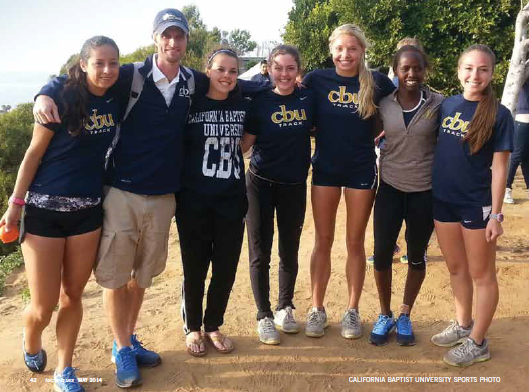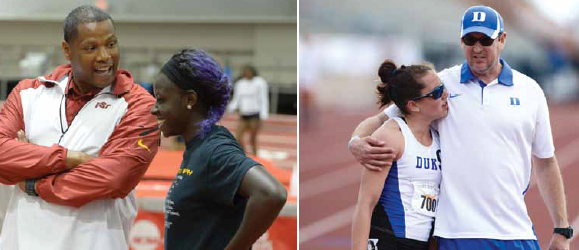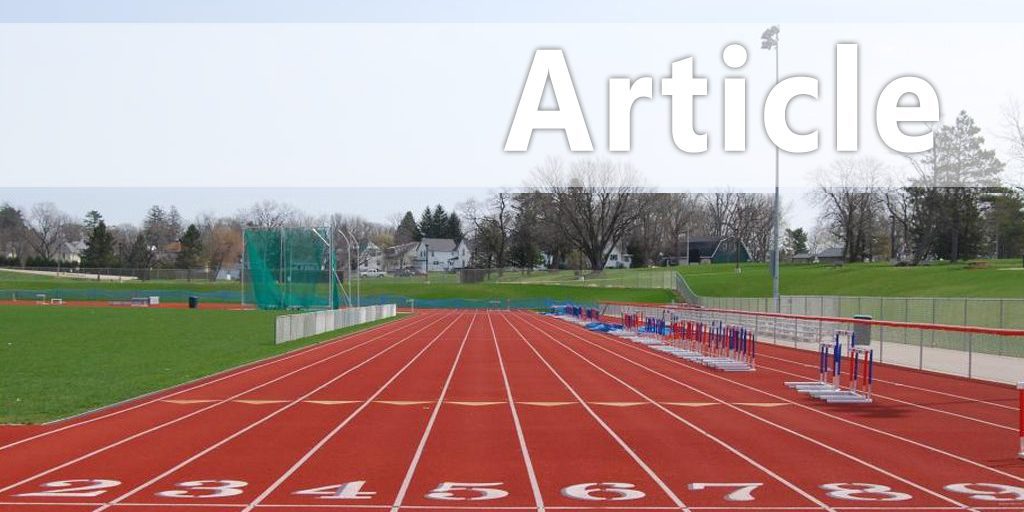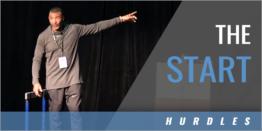| Ties that Bind
By: Ben Gall - Head Cross Country Coach - California Baptist University Originally Published in Techniques Magazine Provided by: USTFCCCA
 Mageau and Vallerand (2003) discuss in depth the successful relationship between coach and athlete. Though it is not sport specific I believe they provide a researched backed model supporting the role of the coach in helping the athlete develop into an autonomous individual who can take ownership of their own growth. "Being autonomy supportive means that an individual in a position of authority takes the others perspective, acknowledges the other's feelings, and provides the other with pertinent information and opportunities for choice, while minimizing the use of pressures and demands" (Mageau & Vallerand, 2003). I believe this sums up what it means to be a coach who is looking out for the long term development of their athletes. In the article they go on to provide a list of seven autonomy-supportive behaviors that coaches can and should engage in if they want to help their athletes develop to their highest potential while under their guidance. These seven areas are: Provide choice within specific rules and limits; provide a rationale for tasks and limits; acknowledge the other person's feelings and perspectives; provide athletes with opportunities for initiative taking and independent work; provide non-controlling competence feedback; avoid controlling behaviors; and prevent ego involvement in athletes. They go on to discuss each one of these in detail. The one I will address is acknowledging the other person's feelings and perspectives. If you understand where an athlete is coming from and their background, you are more likely to act in a way that feels supportive to them. "This acknowledgment requires perspective taking on the coach's part and shows that athletes are perceived by their coach as individuals with specific needs and feelings, and not mere pawns that should be directed" (Mageau & Vallerand 2003). I have seen coaches address this in many different ways in their interactions with their athletes; all of them having success in deepening this relationship and gaining the trust of the individual athletes on their team.  Peter and Sebastian Coe had a different relationship than most of us have with our athletes. They were father and son first and then became coach and athlete. Also, they had the opportunity to have each other's full attention. Most of us do not have that luxury; we coach within an educational system and are in charge of full teams of athletes. On top of our coaching duties we are responsible for recruiting new athletes, doing paperwork, going to meetings and often teach classes at our universities. In addition, most of us are responsible for coaching both male and female athletes. All of this has the effect of taking our time and attention away from developing deep individual relationships with our athletes. I have come to fully believe that it is in the best interest for our teams, our athletes and ourselves to figure out a way to deepen these individual relationships within the constraints of the system we work in. When I think about my experience as an athlete, what I remember most is my relationships with my coaches and team-mates. I had two coaches in my career, my high school coach and my college coach. Both coaches had time to talk with me and learn about my fears, expectations and long term goals. These relationships are intact even today and have impacted how I approach my coaching every day. My high school experience was in Anchorage, Alaska and my coach was someone who brought our school from a very mediocre program to being one of the top programs within a few years. Our team also exploded in size and eventually was close to a hundred kids on the cross country team alone. He made it fun and pushed us to reach our potential, no matter what level we were at. He showed he cared and worked hard to understand who we were. He made us want to succeed and gave us the confidence to do so. It has been over 17 years since he was my coach but our relationship still has an impact on who I am as a person and how I interact with my athletes. He showed me that as a coach you are helping athletes reach their goals while also instilling values that they will carry with them for the rest of their lives. In college I had quite a different relationship with my coach. We had highly successful teams and our coach was someone who made you believe in yourself and your teammates more than you would have thought possible. He made you want to succeed, not just to reach your goals, but to represent the school and team as well or better than the previous teams. He never shied away from letting us know when he was disappointed in a workout, race, or some other area of our lives. On the other hand, he was the first one to praise us when we met our goals, whether athletically, academically, or in some other area. He was able to create an atmosphere where risks were not only okay, but expected. If you were willing to risk and put yourself out there then you gained his respect and admiration. Through this environment I have seen many athletes, myself included, improve dramatically and become fiercely loyal. His office was always open and you could count on finding teammates gathering in there just talk and hang out. He also worked part time on campus doing maintenance and there were always athletes from the team stopping by and helping him out while they talked about life and running. Since graduation our relationship has changed into more of a friendship, but is stronger than ever. When I need advice or to talk about life he is often the first person I call. Another coach who has had a major impact on me and my own coaching career was the head track coach while I was in college and then hired me when I graduated and he took a new job. I spent 10 seasons coaching under him and was able to observe and learn about coaching our sports as well as developing relationships with our athletes that have a lasting impact on them. He has always had an athlete first policy where athletes know that they are cared about as people and not just athletes. Each of these coaches has had a slightly different approach, but the result is the same; creating an environment where athletes feel comfortable opening up about their fears and doubts. This allows the coach to address those feelings, coming to an understanding of that individual athlete. Thus providing the opportunity to help them grapple with their fears and hopes as they grow into the athlete and person they desire to be. I believe it is not so much the approach that matters, but the environment created. The athlete has to know that you care about them as an individual and you are not only open to them sharing their desires and fears with you, but that you expect it. The earlier on in the relationship this trust is created the stronger the relationship can become and the higher chance of success the athlete has. Nine years ago one of my athletes came to me after her freshman cross country season and asked if we could begin setting up a regular weekly meeting to make sure we had time to connect and talk. I agreed, and we began meeting. During the next semester she improved dramatically and ended her season by finishing 10th in the NCAA D2 outdoor championships in the 1500m. She also won conference titles in the indoor 800m and outdoor 1500m. More importantly, I began to understand her better as an athlete and person. I noticed that I could read her better at practice and was able to better adjust her workouts based on what I saw from day to day. These meetings gave me the insight I had been lacking before. We spent time talking a little about training and racing, but more time was spent talking about school and life. Just a half hour a week and we both were more comfortable with each other, which I believe helped her trust me and helped me understand her. The next fall I decided to try something drastic and set up a half hour meeting with all of the athletes I coached; at the time this was around 20 student athletes. At first many of the returners were resistant to the meetings; they felt like it was just one more thing to fill up their already busy schedules. Some of them would regularly skip or cancel the meetings. The male athletes seemed to be particularly resistant. I remained persistent and kept encouraging them to come. With each athlete these meetings took different shapes. With some of them all we talked about was their training and racing, with others we hardly ever talked about this. It was just a time for them to have my complete attention. My commitment to them was that that time each week was theirs to talk about whatever they wanted. Over the next seven years those meetings became an integral part of our program. Consistently on my annual reviews that the students filled out anonymously for the university the meetings were the most commented on aspect of their experience. They felt cared about and loved. We saw our team grow dramatically in size and competitiveness; by the time I left there were twice as many athletes on the roster as there were when the meetings started. When that first athlete qualified for the national meet as a freshman, she was just the second athlete from our university to qualify for the outdoor championships, and the first female. The program now consistently sends multiple athletes to the indoor and outdoor national championships. In 2009 alone the athletes won eight all-American awards. Prior to starting individual athlete meetings we had won no NCAA All-American awards. There was also an improvement in the level of retention and grades once the meetings started. It is much easier to know when a student is struggling in a class or unhappy with their experience when you have an opportunity each week to ask them how things are going and they feel comfortable being open. At least for us, in our program, these weekly meetings became one of the pillars to build the program on. The broader picture is developing a relationship with each individual athlete and making sure they know you care about them as a person and what is going on in their lives both inside and outside of athletics. I came to see my weekly meetings with the athletes as a time for them to share their feelings and desires. They were able direct this time with whatever was on their minds. At times they may not have had anything to talk about and we would just discuss what was going on in their classes or their perception of what was going on with the team. Other times they may have wanted to talk about their training and what direction we were going. Occasionally they had something deeper they wanted to discuss and we had the time for that as well. These meetings provided me with key insight into each one of them, so when I was at practice I understood if they were going through something and could better read them. I learned when it was okay to push a certain athlete and when I needed to back off. Our relationship became much more fluid and a deeper trust was instilled between us that provided both of us an opportunity to benefit and grow from the relationship. In January of 2012 I took my first head coaching position at California Baptist University. Being a head coach in charge of every aspect of the team has made it more difficult to schedule weekly meetings with each athlete. I have however tried to keep regular meetings with each athlete a part of our program. We are still figuring out the best way to do this in our program, but our staff has a priority of making time for each athlete on an individual basis. In ending his article in the February 2010 issue of Techniques Will Freeman made a powerful statement: "This coaching thing is not easy to do well. There is a lot more to it than just having a strong knowledge base and owning a stop-watch. It is a process that, when done well, teaches the athlete to take responsibility for themselves." I believe this statement hits directly on why coaching can be such a rewarding profession. By developing each individual relationship with your athletes you are given the opportunity to not only help them succeed in athletics, but also in life. Over the course of a career you are presented with the chance to positively influence hundreds if not thousands of lives. Over the past 12 years I have come to understand this and it was the athletes I have been lucky enough to coach that taught me the importance and potential impact of each individual relationship. There are a lot of different ways to strengthen your relationship with each one of your athletes and provide them with the environment that will help them to continue to grow and develop as they are on your team. We are each in a unique environment that presents us with many opportunities and challenges. I hope that my experiences can provide insight into how I have tried and continue to try to do this. Each coach needs to acknowledge the constraints they work under as well as the importance of providing a relational environment where their athletes feel free to express themselves and work towards their goals under the safety of the coaches' guidance. If you can figure out how to provide this environment I fully believe that you will not only see athletic success on your teams, but success in all the other areas of life that are so important to our athletes. REFERENCES Freeman, W. (2010). Knowledge and wisdom in coaching. Techniques. 3(4).16-21. Mageau, GA., & Vallerand, RI., (2003). The coach-athlete relationship: a motivational model. Journal of Sports Science. 21(11), 883-904. Miller, D. (2008). Peter Coe: the father who kept Seb on track. The Telegraph. http:11www.telegraph.co.ukInewslfea-tures136376491Peter-Coe-thelather-who-kept-Seb-on-track.html Ben Gall is the Head Cross Country Coach at California Baptist University in Riverside, Calif. Gall holds a doctorate in educational leadership and management from Capella University.
|






